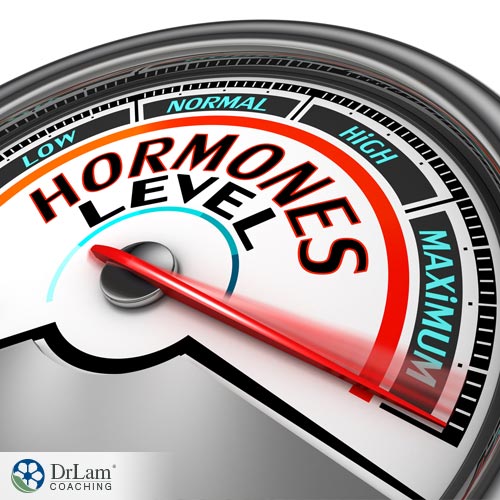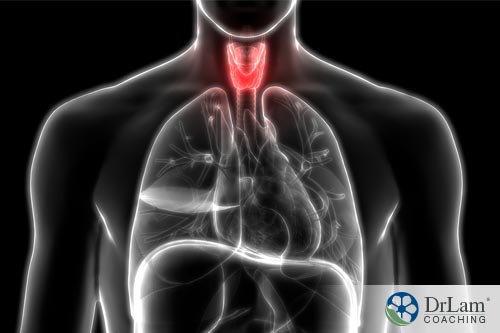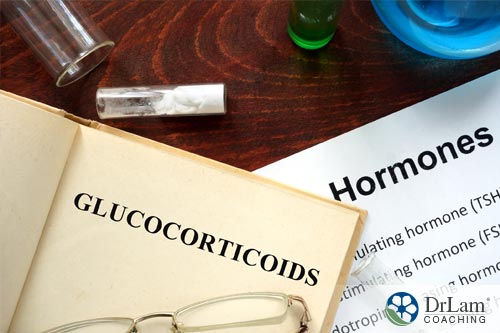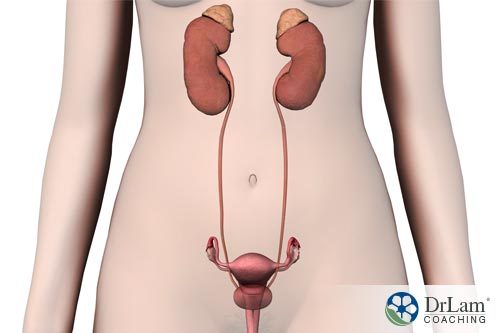 The balance of hormones in your system is absolutely essential for your mental, physical, and emotional health. It is also a very delicate system, and any changes to it can seriously affect the way the various hormones function and the effects they have on the body. These consequences may also be more widespread than you would expect because of hormone permissiveness, a phenomenon that can affect the hormone balance at a subclinical level and often goes undetected.
The balance of hormones in your system is absolutely essential for your mental, physical, and emotional health. It is also a very delicate system, and any changes to it can seriously affect the way the various hormones function and the effects they have on the body. These consequences may also be more widespread than you would expect because of hormone permissiveness, a phenomenon that can affect the hormone balance at a subclinical level and often goes undetected.
When you have a hormone imbalance, you may also suffer from effects that aren’t obviously related to the hormone problem, but are nonetheless a result of it. These less obvious issues can be extremely detrimental to your health and your well being. And if you have a disorder such as Adrenal Fatigue Syndrome (AFS), in which hormonal imbalances are extremely common, you need to be aware of and work to address these related issues. A full-body approach will give you the best chance of addressing all the barriers to your health and healing, which will allow your body to start healing the damage that AFS and hormonal imbalances have done.
Hormones are the body’s chemical messengers. They’re released by the endocrine glands, which are found throughout the body. These include the thyroid, the parathyroid, the thymus, pancreas, and the hypothalamus. These glands and the hormones they excrete actually control most of the body’s major functions. They’re used in incredibly complex systems such as the reproductive system and can even influence and determine emotion and mood. That’s why it can be so devastating to have a hormonal imbalance, because it can affect every system and organ in your body.
There are several different types of hormones with different functions. For example, testosterone and estrogen are the body’s sex hormones, cortisol is known as the “stress hormone,” and melatonin controls your sleep and wake cycle. But almost more important than the different types of hormones is the balance of them. When they’re balanced properly, hormones make the body function properly and thrive. But even small imbalances can be absolutely catastrophic for normal functioning and for the systems that are directly and indirectly affected by the imbalance.
Hormonal imbalances are a relatively common complaint in the modern world. In fact, the number of people who suffer from this type of problem is rapidly increasing, probably due to lifestyle choices, poor diet, and lack of exercise. Hormonal imbalances can be genetic, but there are also a number of external factors that can bring them on including the following:
 But despite the increase in the number of people who have hormone imbalances, most people still don’t understand the implications or the dangers of this problem. Your hormones exist in a delicate balance in your body, and when this balance is upset it can cause a range of symptoms including the following:
But despite the increase in the number of people who have hormone imbalances, most people still don’t understand the implications or the dangers of this problem. Your hormones exist in a delicate balance in your body, and when this balance is upset it can cause a range of symptoms including the following:
Unfortunately, many people associate the symptoms of hormonal imbalance with the normal processes of aging. This is a major problem because most imbalances will worsen over time if not corrected. This can result in a range of serious health problems such as an increased risk of certain types of cancers, osteoporosis, atherosclerosis, endometriosis, cardiovascular disease, and urinary tract infections. But to fully understand the effects that hormonal imbalances can have on your body, you need to understand more about hormone permissiveness and how certain hormones function.
Hormone permissiveness is a term used in endocrinology. It means that certain hormones need the presence of other hormones before they can work to their full potential. So these hormones don’t have their full effects on target cells unless other hormones are present. This is just one of the many ways that hormones interact with each other, and it means that the permissive hormones are usually precursors and activators to the active hormones.
 One example of permissive hormones is thyroid hormones, which have a profound impact on how other hormones interact with cells because of their metabolic rate regulatory function. Without the thyroid hormone, epinephrine would have only a weak effect on the body. Epinephrine is the hormone most commonly called adrenaline, and it allows you to flee from danger or to fight against a threat. It also gives you a jolt of energy when you’re in stressful situations, so if it isn’t working to its fullest, the effects could be profound and even deadly in some situations. But because of hormone permissiveness, epinephrine is felt at full strength. Thyroid hormones have the effect of increasing the number of available receptors on the cells that epinephrine target, which in turn increases epinephrine’s power and impact on the body when it’s needed most. In other words, thyroid hormone facilitates and prime the function of epinephrine.
One example of permissive hormones is thyroid hormones, which have a profound impact on how other hormones interact with cells because of their metabolic rate regulatory function. Without the thyroid hormone, epinephrine would have only a weak effect on the body. Epinephrine is the hormone most commonly called adrenaline, and it allows you to flee from danger or to fight against a threat. It also gives you a jolt of energy when you’re in stressful situations, so if it isn’t working to its fullest, the effects could be profound and even deadly in some situations. But because of hormone permissiveness, epinephrine is felt at full strength. Thyroid hormones have the effect of increasing the number of available receptors on the cells that epinephrine target, which in turn increases epinephrine’s power and impact on the body when it’s needed most. In other words, thyroid hormone facilitates and prime the function of epinephrine.
Cortisol is another permissive hormone. At low levels, cortisol activates certain growth hormones. In children, these hormones spur development. In adults, they help to regulate body composition, muscle and bone growth, the metabolism of sugars and fats, and may even regulate heart function.
Cortisol is part of a class of hormones called glucocorticoids, and it functions by attaching to receptors inside a cell and either enhancing or suppressing DNA changes and the synthesis of proteins. They also inhibit the secretion of cytokines, which are substances excreted by certain immune cells that affect the behavior of other cells, particularly when it comes to immune and inflammatory responses.
Progesterone, likewise, is needed in very small amounts as a priming agent for estrogen to work well.
The process of facilitating and optimizing the body’s permissiveness function to the required minimum level for optimum function is referred to as “priming.” When a hormone is below that minimum level needed to prime another hormone, the entire hormonal cascade can be dysregulated, leading to hormonal axis disruption. The practice of hormone replacement using both progesterone and estrogen, even when only estrogen appears to be deficient in laboratory tests, is built on this concept.
This is important to know if you have AFS because cortisol is the hormone released by the adrenals and is usually negatively affected by adrenal fatigue. The hormone permissiveness effect also changes when there are abnormally high levels of cortisol in the body, resulting in atypical effects. So if you’re chronically stressed over a long period of time, the effects that cortisol has on other hormones in your body could change in unpredictable ways.
A recent study was performed to explore the effects of hormone permissiveness on how glucocorticoids (GCs) function during times of stress. GCs are steroid hormones that can reduce inflammation, but under some conditions, they may have the opposite effect on the body. This is due to the fact that GCs have a number of permissive functions, and one of them increases inflammatory processes. This has implications for the understanding of hormones, as well as for the health and recovery of people who have diseases or disorders that cause excessive amounts of inflammation.
When your body is stressed or experiences damage, it activates inflammasomes, particularly one known as NLRP3. Inflammasomes are multiprotein complexes that control and direct inflammatory processes in the body. They try to protect and heal the body by causing inflammation to get rid of the cause of the damage. This is a vital part of the body’s stress response, and it may be exacerbated by GCs, perhaps even by the stress hormone cortisol. The most recent study found that GCs prime inflammasomes, which means that they increase their effects, otherwise known as hormone permissiveness.
 Hormone permissiveness has a clear purpose in the body. It’s meant to increase inflammation as a way of protecting the body from stressors and expelling dangerous material. The inflammation that is triggered ends up being a positive and necessary protection for the body. However, it has a number of negative effects, particularly if the source of the stress isn’t something physical that can be expelled. The new model suggests that in times of high stress, the GCs reduce inflammation so the body’s energy can be used to cope with the immediate threat. At the same time, it primes the inflammasomes to activate once the life or death stress is over, and the body’s focus can shift to recuperation and healing. This means that inflammation in the body will actually increase after the immediate threat is over and accounts for the inflammatory effects of GCs.
Hormone permissiveness has a clear purpose in the body. It’s meant to increase inflammation as a way of protecting the body from stressors and expelling dangerous material. The inflammation that is triggered ends up being a positive and necessary protection for the body. However, it has a number of negative effects, particularly if the source of the stress isn’t something physical that can be expelled. The new model suggests that in times of high stress, the GCs reduce inflammation so the body’s energy can be used to cope with the immediate threat. At the same time, it primes the inflammasomes to activate once the life or death stress is over, and the body’s focus can shift to recuperation and healing. This means that inflammation in the body will actually increase after the immediate threat is over and accounts for the inflammatory effects of GCs.
This is a fairly efficient system. During times of heightened threat levels and stress, it helps the body focus on the physical functions it needs to survive. And once the stress levels dip again, the hormone permissiveness effect activates and inflammation increases to help the body heal from whatever damage the stressor caused. However, this process could cause a number of serious problems when the stress event is chronic and ongoing and has no concrete cause that can be eliminated from the body. This is what happens when someone has AFS. Their adrenals produce too much cortisol to cope with the ongoing, chronic stress of daily life. This naturally results in increased inflammation as cortisol levels dip slightly and the hormone permissiveness effect kicks in.
This is even more important when you have hormonal imbalances. Because hormone permissiveness means that some hormones need the right amount of other hormones to become activated, it means that some hormones may stay deactivated while others will be less effective, or become unnecessarily activated. This could cause a range of negative effects and unpredictable problems within the body that could exacerbate the hormonal imbalance and any underlying problems such as AFS.
AFS is a stress-related disorder that often causes hormonal imbalances as well as problems with the organs and systems that produce and use those hormones. Stress can be extremely damaging for the human body, which is why it has a way to protect itself during times of stress. This is called the NeuroEndoMetabolic (NEM) Stress Response. The NEM stress response not only protects the body from the harmful effects of stress, it also causes changes that are necessary during times of stress. This includes causing increased alertness and generally preparing the body to respond to a threat.
 But the NEM stress response is only meant to be activated in the short term, to turn on and off in response to physical stressors such as injury or threat. In the modern world, these kinds of stressors are relatively rare, but there are other kinds of stressors that use this system. These days, emotional and mental stressors are not only common, they’re also an accepted part of modern life. People go through their lives in a constant state of low-grade stress. This chronic stress may seem relatively normal, but it can cause a lot of damage to the body. Prolonged periods of stress have been linked to a higher risk of cancer, heart disease, and stroke. They can also cause the NEM stress response to become overworked and fatigued.
But the NEM stress response is only meant to be activated in the short term, to turn on and off in response to physical stressors such as injury or threat. In the modern world, these kinds of stressors are relatively rare, but there are other kinds of stressors that use this system. These days, emotional and mental stressors are not only common, they’re also an accepted part of modern life. People go through their lives in a constant state of low-grade stress. This chronic stress may seem relatively normal, but it can cause a lot of damage to the body. Prolonged periods of stress have been linked to a higher risk of cancer, heart disease, and stroke. They can also cause the NEM stress response to become overworked and fatigued.
When the NEM stress response is overworked, the adrenal glands can become fatigued. The adrenals are an essential part of this system, and they’re also essential in daily functioning as well. The adrenals release more than 50 different hormones, with the most important being cortisol, sometimes known as the ‘stress hormone’. Cortisol regulates metabolism and the immune system and helps give the body the energy it needs during times of stress, effectively preparing it to run or to fight. Also, because of hormone permissiveness, it affects other systems and functions in your body that are necessary for normal functioning in less obvious ways that are nonetheless incredibly important.
When you experience stress for a long period of time, your need for cortisol remains high, but the adrenals struggle to meet this demand. In the early stages of adrenal fatigue, the adrenal glands still manage to release appropriate amounts of cortisol, resulting in relatively normal levels in the blood, but the damage done by the overwork starts to show as a range of strange and worsening symptoms that aren’t easily attributed to any specific problem appear. If the situation isn’t addressed, it can lead to imbalances throughout your body and eventually even complete systems failure. This is why it’s so important to learn more about AFS and how to address the underlying problem rather than just trying to alleviate symptoms.
People with AFS often experience chronic and damaging levels of inflammation. This is a natural process that is caused by stress. Inflammation is actually designed to protect the body from causes of stress and to help expel any dangerous objects or bacteria. The changes associated with inflammation such as heat, swelling, redness, and pain, are the body’s attempts to rid itself of what’s damaging it. For injuries or illness, this is a very effective strategy, but when the stress is emotional or physical, there isn’t a physical cause that can be eliminated. As a result, when you’re emotionally or mentally stressed, your body produces inflammation that actually does damage to the various systems and circuits in your body and may explain many of the symptoms of AFS. This can also cause damage to the inflammation circuit that worsens the overall problem and causes more stress that impedes your health and your ability to heal.
 If you have AFS, it’s likely that you already have a lot of inflammation in your body. Many of the troubling and uncomfortable symptoms of this disorder cause damage to the various systems and general chronic inflammation. However, because of hormone permissiveness, the increased demand for cortisol that’s so strongly connected to AFS may actually cause further inflammation. AFS causes your body to produce more cortisol in response to stress. Unfortunately, this stress is typically mental and emotional rather than physical. It’s also ongoing, which means that the demand for cortisol remains high over a long period of time. And because of hormone permissiveness, this can cause the priming of inflammasomes, which causes more inflammation that just does further damage to the body. Over-activation of hormone permissiveness in such cases can have an overall negative effect on the body.
If you have AFS, it’s likely that you already have a lot of inflammation in your body. Many of the troubling and uncomfortable symptoms of this disorder cause damage to the various systems and general chronic inflammation. However, because of hormone permissiveness, the increased demand for cortisol that’s so strongly connected to AFS may actually cause further inflammation. AFS causes your body to produce more cortisol in response to stress. Unfortunately, this stress is typically mental and emotional rather than physical. It’s also ongoing, which means that the demand for cortisol remains high over a long period of time. And because of hormone permissiveness, this can cause the priming of inflammasomes, which causes more inflammation that just does further damage to the body. Over-activation of hormone permissiveness in such cases can have an overall negative effect on the body.
Controlling inflammation is key to healing and recovering from AFS. This means working against the natural effects of your increased cortisol levels and the processes of hormone permissiveness that are meant to protect you. The difficulty of this is further compounded by the hormonal imbalances that are often a part of AFS and may further activate the processes that cause inflammation and damage your overall health.
 Imbalances in the hormonal circuit are extremely common with AFS. The hormonal circuit consists of the adrenal glands, the reproductive systems, and the thyroid, each of which can be affected by general body fatigue and by the degradation of the other organs in the circuit. So when the adrenals become fatigued, the reproductive organs and the thyroid start to be affected as well. This can cause a range of symptoms including chronic fatigue, insomnia, joint pain, brain fog, diabetes, skin problems, intolerance to cold temperatures, exercise intolerance, a decreased metabolism, irregular menstrual cycles, PMS, endometriosis, mood swings and disorders, and inexplicable weight gain. Because the hormonal circuit is responsible for the balance of many of the body’s hormones, imbalances in the circuit may also cause interruptions of the processes of hormone permissiveness and a host of other problems and symptoms.
Imbalances in the hormonal circuit are extremely common with AFS. The hormonal circuit consists of the adrenal glands, the reproductive systems, and the thyroid, each of which can be affected by general body fatigue and by the degradation of the other organs in the circuit. So when the adrenals become fatigued, the reproductive organs and the thyroid start to be affected as well. This can cause a range of symptoms including chronic fatigue, insomnia, joint pain, brain fog, diabetes, skin problems, intolerance to cold temperatures, exercise intolerance, a decreased metabolism, irregular menstrual cycles, PMS, endometriosis, mood swings and disorders, and inexplicable weight gain. Because the hormonal circuit is responsible for the balance of many of the body’s hormones, imbalances in the circuit may also cause interruptions of the processes of hormone permissiveness and a host of other problems and symptoms.
The interactions within the hormonal circuit are complicated, and when the circuit becomes unbalanced it can cause both hormonal problems as well as a range of symptoms associated with AFS. The adrenals secrete cortisol as well as more than fifty other hormones that are essential for everyday functioning. So as the adrenals degrade, the effects are usually widespread and difficult to trace back to the original source. The thyroid is one of the glands that is affected as the adrenals degrade. The thyroid regulates temperature and metabolism, so when this organ becomes unbalanced it causes fatigue and weight gain. And as these organs start to slow, so do the reproductive organs and the associated hormones. The hormones that aid reproduction, testosterone and estrogen, both drop when you have AFS because the body no longer has the energy to sustain reproductive processes and is focused purely on survival. When this occurs, it can play havoc on the other systems in the body, the other organs in the circuit, and on overall health.
Imbalances in the hormonal circuit at the subclinical level are difficult for medical specialists to identify. Although they may be able to identify the individual hormonal imbalances, the overarching circuit irregularity may go unnoticed. This can result in incomplete approaches to addressing the issue that ignore the interconnectedness of the three organs in this circuit. And attempting to address imbalances in the thyroid or reproductive hormones without healing the adrenal fatigue is more likely to do harm than good at every stage of AFS.
The adrenal glands are quite obviously very severely affected by AFS. As the body becomes stressed and there’s little time for relief and healing, the adrenals increase their production of cortisol in response. This can activate the hormone permissiveness effect and cause excessive amounts of inflammation, worsening the original problem.
After a prolonged period of this, the adrenals can become fatigued and struggle to keep up with the demand for cortisol. Unfortunately, in the early stages, this is usually dismissed as part of having a busy lifestyle. However, dismissing what are deemed to be ordinary symptoms only causes further damage and fatigue. As the symptoms progress, the fatigue becomes more pronounced and the adrenals can no longer keep up with the demand for cortisol, so their output starts to decline. This can then interrupt the processes of hormone permissiveness, as cortisol is less available in the body to stimulate growth hormones and metabolism. However long before this happens, the adrenal fatigue starts to affect other parts of the body.
The first organ to experience decline after the adrenals is the pancreas, which causes blood sugar problems and further imbalances in the body.
 The next part of the hormone circuit to become involved is the thyroid gland. The thyroid releases a number of essential hormones into the body including T3 and T4, which regulate the body’s temperature, heart rate, and metabolism. This degradation is also important to the liver because of hormone permissiveness. Thyroid hormones stimulate the synthesis of several liver hormones. This highlights the interconnectedness of these seemingly disparate systems and the danger of interruptions or problems within the hormone circuit.
The next part of the hormone circuit to become involved is the thyroid gland. The thyroid releases a number of essential hormones into the body including T3 and T4, which regulate the body’s temperature, heart rate, and metabolism. This degradation is also important to the liver because of hormone permissiveness. Thyroid hormones stimulate the synthesis of several liver hormones. This highlights the interconnectedness of these seemingly disparate systems and the danger of interruptions or problems within the hormone circuit.
Once the thyroid is involved with AFS, medication is usually recommended to try to correct the imbalance. However, unless the underlying adrenal problem is addressed, any attempts to improve the functioning of the thyroid will fail and perhaps even cause paradoxical reactions which will worsen the overall situation.
After this stage, the reproductive organs become involved and the result is often symptoms of severe hormonal imbalance. Sufferers are often given hormone replacement therapy to try to alleviate the symptoms of these imbalances, but this effort will also fail to cause long-term recovery if the adrenal fatigue is not addressed first. Many hormones produced by the body become affected at this stage including estrogen, testosterone, progesterone, and insulin. Because of the adrenal fatigue, they can’t work to optimal levels and can’t achieve their normal homeostasis. The essential functions activated by hormone permissiveness may also be stunted or unnecessarily exaggerated as well. This confusion of dysregulation and degradation can be extremely serious if it’s not addressed and the imbalances corrected.
None of the organs or systems in the body function properly when the hormonal circuit is unbalanced. The metabolic system is often one of the first to suffer from ill effects, compromising nutrient absorption and resulting in general malnutrition and ill health. This system usually suffers from a range of maladies connected to imbalances in the hormonal circuit including irritable bowel, gut bacteria imbalances, food sensitivities, and reduced liver function.
The dysregulation in the metabolic system also extends to elimination and detoxification. Toxins in the system build up and basically poison the whole system, causing brain fog, rashes, allergies and joint and muscle pain. All these effects occur because of the importance of the hormones in the functioning of every part of the body, and this highlights the importance of finding an effective way to re-balance the circuit and manage the underlying problem so that it doesn’t occur again.
 The elements of the hormonal circuit need to be in balance for the body and the hormones to function normally. This will allow the hormones to function as normal and restore the processes of hormone permissiveness. Achieving this demands a holistic and whole body response. Unfortunately, most attempts to balance and heal the body tend to focus on whichever part of the hormonal circuit is most obviously malfunctioning. As a result, people with AFS usually find themselves on a range of medications meant to address hormonal imbalances. For example, many people in this situation find themselves taking thyroid medications to try to balance and restore their thyroid hormone functions. This may work in the short-term, but over the long-term, it can have some very negative effects.
The elements of the hormonal circuit need to be in balance for the body and the hormones to function normally. This will allow the hormones to function as normal and restore the processes of hormone permissiveness. Achieving this demands a holistic and whole body response. Unfortunately, most attempts to balance and heal the body tend to focus on whichever part of the hormonal circuit is most obviously malfunctioning. As a result, people with AFS usually find themselves on a range of medications meant to address hormonal imbalances. For example, many people in this situation find themselves taking thyroid medications to try to balance and restore their thyroid hormone functions. This may work in the short-term, but over the long-term, it can have some very negative effects.
AFS often causes paradoxical reactions, so people with this disorder often find themselves experiencing unexpected changes in the other organs that make up the hormonal circuit. If you have AFS and find yourself taking these medications, you’ll probably find yourself improving slightly before your overall condition declines. This can be very dispiriting, and it might make you feel even more desperate as you try to cope with the changes and dysregulations in your body and find strategies that actually improve your health.
The key to recovering from the hormonal imbalance that occurs as a result of AFS is to address the underlying cause, addressing both clinical and subclinical findings. Unfortunately, laboratory tests cannot help us in determining fatigue caused by hormonal permissiveness. This means reducing stressors that are causing the adrenals to be overworked and bringing your hormones back in balance are the key to better health. It’s important that this is done with the assistance of a medical professional who understands the processes of AFS. For patients, designing your own recovery plan can be difficult and rife with problems and potential pitfalls. Most patients just don’t have the clinical experience to plan and carry out a balanced approach to healing. Getting it wrong can lead to increased degradation and dysregulation of the hormonal circuit as well as other systems in the body.
Unfortunately, finding a medical professional who understands the processes of AFS and how to design a balanced and effective plan for recovery can be difficult. AFS isn’t well understood or accepted by most of the medical establishment, and it can be hard to find a physician who even knows what it is. But finding the right kind of help is essential for AFS recovery because it will only get worse over time, and if ignored, it can result in full body shut down.
 Hormonal imbalances are extremely common and can occur on their own or as a result of disorders such as AFS. They can also be extremely detrimental to your overall health as well as to the health of various systems and organs in your body. Imbalances in the hormonal circuit can affect every part of your body, sometimes in unexpected and idiosyncratic ways. This is made particularly true by hormone permissiveness, the biological function by which certain hormones activate and affect the way other hormones function. If you suffer from an imbalance or disorders that affect and unbalance the hormonal circuit, this means that the consequences of the original imbalance could be even more widely spread than you might expect. Hormone permissiveness could cause negative consequences, which is why you need to address the underlying problems associated with your hormone imbalances if you want to alleviate your symptoms and enjoy good health once more.
Hormonal imbalances are extremely common and can occur on their own or as a result of disorders such as AFS. They can also be extremely detrimental to your overall health as well as to the health of various systems and organs in your body. Imbalances in the hormonal circuit can affect every part of your body, sometimes in unexpected and idiosyncratic ways. This is made particularly true by hormone permissiveness, the biological function by which certain hormones activate and affect the way other hormones function. If you suffer from an imbalance or disorders that affect and unbalance the hormonal circuit, this means that the consequences of the original imbalance could be even more widely spread than you might expect. Hormone permissiveness could cause negative consequences, which is why you need to address the underlying problems associated with your hormone imbalances if you want to alleviate your symptoms and enjoy good health once more.
© Copyright 2019 Michael Lam, M.D. All Rights Reserved.
Hormone permissiveness is a biological function in the body by which certain hormones are activated by other hormones. This is particularly important if you suffer from hormonal imbalances because it means that the effects of the problem may be more widespread than you think.
